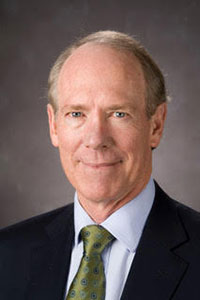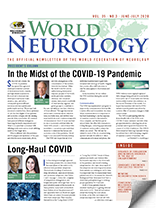
Since my last column, the COVID-19 pandemic has spread through most developed countries courtesy of international travel, tourism, and high-density populations. It is now set to decimate less developed countries in South America, Asia, and Africa, consequent upon insufficient resources and less sophisticated public health services. Those least well-resourced countries face, like in epidemics of old, the twin blights of the epidemic and economic collapse and risk ensuing anarchy. Even some better-off countries have pursued different strategies in balancing the health requirements and when to re-open their economies with differing results now and no doubt differing results in the longer term.

William Carroll, MD
What is different with this pandemic and the plagues and epidemics of the past, and even the more recent SARS, Ebola, and Zika emergencies, is the concatenation of the modern world by the internet. While the world looks for a more unified inter-governmental response, peoples of the world, and in particular scientists, clinicians, and concerned citizens, have joined a multitude of international, regional, and global groups to contribute to the care, surveillance, and data collection of those affected. Through the internet and modern communications, infection rates, mortality rates, and survival rates issue daily from most countries irrespective of denominators. Most of us are involved in one or more such activities while we watch with concern — and at times with incredulity — as nations make individual decisions to minimize the human and economic costs of this pandemic. We all hope to see a successful formula develop.
The WFN also hopes that all of its individual member neurologists have remained safe and in good health. Happily, the London office staff have done so and the same applies to the trustees and officers.
In the meantime, let me outline the WFN activities during the current situation.
Communication
The WFN has implemented a program to improve the communication between the London office and its members. In a time when communication is so important, it has been heartening to see the response of member societies to this initiative. Once complete, and this first part is almost there, the office will commence a rolling dialogue, contacting approximately 10 members each month to ensure the details are current. This will see the details for each of the 122 societies being updated annually. In addition to direct communication by email and phone, the WFN website is now regularly updated with changes being advised by social media. More active use of social media also follows each monthly trustees teleconference on the second Thursday of the month. It is hoped that members will visit the WFN website more frequently and advise the London office of necessary changes to their contact details.
The WFN is participating with the Brain Health Unit of the WHO in its COVID-19 neuro endeavor and with other groups interested in collecting data about potential neurological involvement in the course of COVID-19 infection. The WFN’s Environmental Neurology Specialty Group has advised that it will be keeping a registry of member societies of members who are doing this at a national level. Links to members of the Global Neurology Alliance, who are posting information related to their specialty and COVID-19, are available on the WFN COVID-19 website and undergo regular updating. WFN member societies also have available a bulletin board on the WFN website to post news on the pandemic situation in their countries.
Education
Like most global or large regional organizations, the WFN had been moving to a more electronic base for education. The COVID-19 pandemic has provided an additional spur to this direction. With the cancellation of the African Sub-Saharan Regional Teaching Course for 2020, which had been scheduled for Kampala in September, AFAN and the WFN have proposed an e-learning day. Plans are advancing for this to occur as the WFN/AFAN e-Learning Day focused on “Stroke: A Treatable and Preventable Disease.” It is likely that the EAN and AAN will contribute to this very necessary alternative. More information will be found on the WFN website. Plans for the XXV WCN in October 2021, at the new state-of-the-art La Nuvola Conference Centre in Rome, are advancing with the valuable assistance of the Society of Italian Neurology. The scientific and teaching course programs are now being finalized with additional flexibility to permit virtual programming if required.
Promotion
There are a number of other activities engaging the WFN at present which, while being broadly educational, also promote the visibility and good name of the WFN. World Brain Day is the most imminent of these. As most will know, World Brain Day (WBD) has continued to evolve. It typically begins on July 22 each year, the anniversary of the founding of the WFN, which partners with a member of the Global Neurology Alliance closely representing the WBD topic. WBD runs for two to three months to provide greater dissemination and authority of its message. This year the WFN is excited to partner with the International Parkinson Disease and Movement Disorder Society and believes that the 2020 WBD will achieve similar goals as those that the International Headache Society brought to the 2019 campaign.
A second promotional activity being developed is the Brain Health Initiative. This will focus on the importance of brain health in general and at present will comprise five modules of related topics. The Brain Health Initiative is a matter that dates from the GNA meeting held during the Lisbon EAN meeting in 2018. Several members of the Global Neurology Alliance expressed a desire for the WFN to consider such a campaign. The initiative is planned to run in parallel with the more disease-specific WBD campaign.
Other WFN Activities
There are other activities engaging the WFN at present which I will enumerate. First, the Annual General Meeting (AGM) of the Council of Delegates will be a virtual meeting on a Zoom platform commencing at 12 p.m. on Sept. 9, British Summer Time. Details of this important meeting and its agenda will be disseminated directly to member societies by email and to the membership at large on the website. Second, the election of a new trustee to fill the vacancy created by Prof. Riadh Gouider after completing his term will be undertaken in the week before the AGM, in order not to disadvantage member societies in time zones where the AGM might be occurring at unsociable hours.
While on the topic of WFN trustees, it is with much pleasure that I welcome Prof. Marianne de Visser as a co-opted trustee. Her experience, wisdom, and integrity will complement the work of the WFN. (See box above.)
Third, notification has been sent to member societies in the Asian and Oceanian Association of Neurology requesting expressions of interest in hosting the 2025 (XXVII) WCN. To date four member societies have done so.
Let me also, on behalf of the trustees and all member societies, express my gratitude to the work of the London office during the pandemic. They have been locked down, out of the office, but their output and the quality of work has remained exemplary.
Finally, I wish all members of the WFN, their families, and patients a safe passage through this pandemic.
